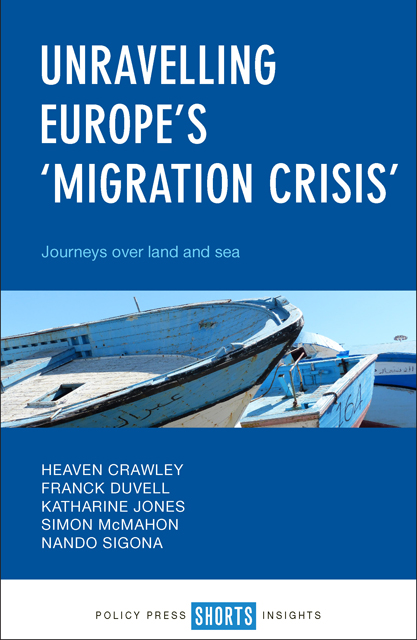Book contents
- Frontmatter
- Contents
- List of figures
- List of boxes
- Acronyms
- Notes on the authors
- Acknowledgements
- Foreword by Joanne Liu
- one The view from Europe
- two Unravelling Europe’s ‘migration crisis’
- three Not one route but many: unpacking migration to Europe
- four The decision to leave
- five Navigating borders and danger: the use of smugglers
- six Moving on
- seven Across the sea… and beyond
- eight Rethinking Europe’s response
- References
- Index
five - Navigating borders and danger: the use of smugglers
Published online by Cambridge University Press: 21 April 2023
- Frontmatter
- Contents
- List of figures
- List of boxes
- Acronyms
- Notes on the authors
- Acknowledgements
- Foreword by Joanne Liu
- one The view from Europe
- two Unravelling Europe’s ‘migration crisis’
- three Not one route but many: unpacking migration to Europe
- four The decision to leave
- five Navigating borders and danger: the use of smugglers
- six Moving on
- seven Across the sea… and beyond
- eight Rethinking Europe’s response
- References
- Index
Summary
Discussion of smuggling dominated the media airwaves and policy pronouncements during the ‘migration crisis’ of 2015. The European response emphasised the predominance of ‘transnational smuggler networks’ in facilitating people into Europe with proposed expanded military action to ‘smash the trafficking gangs’1 and ‘disrupt’ the smuggler’s business model.2 In this story, smugglers were the ‘villains’ who were responsible for the exploitation and the loss of life of refugees and migrants in exchange for profit. But, as this chapter will show, this perspective is an over-simplification and obscures the reasons why people engaged the services of smugglers.
Every single one of the 500 people we spoke to had utilised the ‘services’ of a smuggler for at least one stage of their journeys from their place of origin to the place where we interviewed them. We know that migrant and refugees’ interactions with smugglers shape the routes, lengths and dangerousness of journeys (Salt and Hogarth, 2000; Van Liempt, 2007; Hernandez-Leon, 2008; Sanchez, 2015; Belloni, 2016; Tinti and Reitano, 2016). Our data presents an opportunity to elaborate on the use of smugglers across the different migration routes taken by the respondents (described in Chapter Three) to reach Greece, Italy, Malta and Turkey. Our findings also point to the need for policymakers to consider far more carefully the nuances of who smugglers are and what they do, as well as the, often intricate, relationships they develop with the people they are smuggling.
Reasons for the use of smugglers
Only a handful of respondents who crossed the Mediterranean in 2015 hired a smuggler at the point of departure to facilitate their movement all the way from their home country. Rather, most engaged smugglers to facilitate specific legs of the journey, making decisions dependent on the local context at that time. This reflects the findings of Chapters Three, Four and Six that a significant proportion of those arriving in Europe in 2015 did so after making multiple decisions about where, and when, to go rather than by making a singular and direct journey to Europe. The findings of our research indicate that the point at which respondents involved a smuggler to help facilitate their journeys was primarily contingent on two factors:
• whether smugglers were required to help people escape or bypass conflict, danger or persecution at home or en route (Navigating danger); and
- Type
- Chapter
- Information
- Unravelling Europe's 'Migration Crisis'Journeys Over Land and Sea, pp. 73 - 94Publisher: Bristol University PressPrint publication year: 2017



